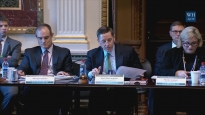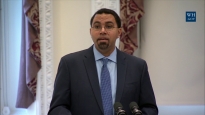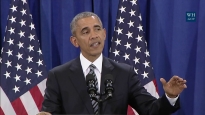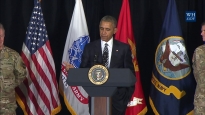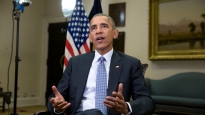President Obama Speaks on the Situation in Iraq
June 19, 2014 | 29:36 | Public Domain
President Obama delivers a statement from the White House Press Briefing Room on the situation in Iraq, and the steps the U.S. is taking in response.
Remarks by the President on the Situation in Iraq
James S. Brady Press Briefing Room
1:32 P.M. EDT
THE PRESIDENT: Good afternoon, everybody. I just met with my national security team to discuss the situation in Iraq. We’ve been meeting regularly to review the situation since ISIL, a terrorist organization that operates in Iraq and Syria, made advances inside of Iraq. As I said last week, ISIL poses a threat to the Iraqi people, to the region, and to U.S. interests. So today I wanted to provide you an update on how we’re responding to the situation.
First, we are working to secure our embassy and personnel operating inside of Iraq. As President, I have no greater priority than the safety of our men and women serving overseas. So I’ve taken some steps to relocate some of our embassy personnel, and we’ve sent reinforcements to better secure our facilities.
Second, at my direction, we have significantly increased our intelligence, surveillance, and reconnaissance assets so that we’ve got a better picture of what’s taking place inside of Iraq. And this will give us a greater understanding of what ISIL is doing, where it’s located, and how we might support efforts to counter this threat.
Third, the United States will continue to increase our support to Iraqi security forces. We’re prepared to create joint operation centers in Baghdad and northern Iraq to share intelligence and coordinate planning to confront the terrorist threat of ISIL. Through our new Counterterrorism Partnership Fund, we’re prepared to work with Congress to provide additional equipment. We have had advisors in Iraq through our embassy, and we’re prepared to send a small number of additional American military advisors -- up to 300 -- to assess how we can best train, advise, and support Iraqi security forces going forward.
American forces will not be returning to combat in Iraq, but we will help Iraqis as they take the fight to terrorists who threaten the Iraqi people, the region, and American interests as well.
Fourth, in recent days, we’ve positioned additional U.S. military assets in the region. Because of our increased intelligence resources, we’re developing more information about potential targets associated with ISIL. And going forward, we will be prepared to take targeted and precise military action, if and when we determine that the situation on the ground requires it. If we do, I will consult closely with Congress and leaders in Iraq and in the region.
I want to emphasize, though, that the best and most effective response to a threat like ISIL will ultimately involve partnerships where local forces, like Iraqis, take the lead.
Finally, the United States will lead a diplomatic effort to work with Iraqi leaders and the countries in the region to support stability in Iraq. At my direction, Secretary Kerry will depart this weekend for meetings in the Middle East and Europe, where he’ll be able to consult with our allies and partners. And just as all Iraq’s neighbors must respect Iraq’s territorial integrity, all of Iraq’s neighbors have a vital interest in ensuring that Iraq does not descend into civil war or become a safe haven for terrorists.
Above all, Iraqi leaders must rise above their differences and come together around a political plan for Iraq’s future. Shia, Sunni, Kurds -- all Iraqis -- must have confidence that they can advance their interests and aspirations through the political process rather than through violence. National unity meetings have to go forward to build consensus across Iraq’s different communities. Now that the results of Iraq’s recent election has been certified, a new parliament should convene as soon as possible. The formation of a new government will be an opportunity to begin a genuine dialogue and forge a government that represents the legitimate interests of all Iraqis.
Now, it’s not the place for the United States to choose Iraq’s leaders. It is clear, though, that only leaders that can govern with an inclusive agenda are going to be able to truly bring the Iraqi people together and help them through this crisis. Meanwhile, the United States will not pursue military options that support one sect inside of Iraq at the expense of another. There’s no military solution inside of Iraq, certainly not one that is led by the United States. But there is an urgent need for an inclusive political process, a more capable Iraqi security force, and counterterrorism efforts that deny groups like ISIL a safe haven.
In closing, recent days have reminded us of the deep scars left by America’s war in Iraq. Alongside the loss of nearly 4,500 American patriots, many veterans carry the wounds of that war, and will for the rest of their lives. Here at home, Iraq sparked vigorous debates and intense emotions in the past, and we’ve seen some of those debates resurface.
But what’s clear from the last decade is the need for the United States to ask hard questions before we take action abroad, particularly military action. The most important question we should all be asking, the issue that we have to keep front and center -- the issue that I keep front and center -- is what is in the national security interests of the United States of America. As Commander-in-Chief, that’s what I stay focused on. As Americans, that’s what all of us should be focused on.
And going forward, we will continue to consult closely with Congress. We will keep the American people informed. We will remain vigilant. And we will continue to do everything in our power to protect the security of the United States and the safety of the American people.
So with that, I’m going to take a couple of questions. I’ll start with Colleen McCain Nelson of the Wall Street Journal.
Q Thank you, Mr. President. Do you have any confidence in Prime Minister Maliki at this point? And can Maliki bring political stability to Iraq?
THE PRESIDENT: As I said, it’s not our job to choose Iraq’s leaders. Part of what our patriots fought for during many years in Iraq was the right and the opportunity for Iraqis to determine their own destiny and choose their own leaders. But I don’t think there’s any secret that right now at least there is deep divisions between Sunni, Shia and Kurdish leaders. And as long as those deep divisions continue or worsen, it’s going to be very hard for an Iraqi central government to direct an Iraqi military to deal with these threats.
And so we’ve consulted with Prime Minister Maliki, and we’ve said that to him privately. We’ve said it publicly that whether he is prime minister, or any other leader aspires to lead the country, that it has to be an agenda in which Sunni, Shia and Kurd all feel that they have the opportunity to advance their interests through the political process. And we’ve seen over the last two years, actually dating back to 2008, 2009 -- but I think worse over the last two years -- the sense among Sunnis that their interests were not being served, that legislation that had been promised around, for example, De-Ba’athification had been stalled.
I think that you hear similar complaints that the government in Baghdad has not sufficiently reached out to some of the tribes and been able to bring them in to a process that gives them a sense of being part of a unity government or a single nation-state. And that has to be worked through.
Part of the reason why we saw better-equipped Iraqi security forces with larger numbers not be able to hold contested territory against ISIL probably reflects that lack of a sense of commitment on the part of Sunni communities to work with Baghdad. And that has to be fixed if we’re going to get through this crisis.
Jim Acosta.
Q Thank you, Mr. President. Americans may look at this decision that you’re making today as a sneak preview of coming attractions; that the number of advisors that you’re planning to send in may just be the beginning of a boots-on-the-ground scenario down the road. Why is Iraq’s civil war in the national security interests of the United States? And are you concerned about the potential for mission creep?
THE PRESIDENT: I think we always have to guard against mission creep, so let me repeat what I’ve said in the past: American combat troops are not going to be fighting in Iraq again.
We do not have the ability to simply solve this problem by sending in tens of thousands of troops and committing the kinds of blood and treasure that has already been expended in Iraq. Ultimately, this is something that is going to have to be solved by the Iraqis.
It is in our national security interests not to see an all-out civil war inside of Iraq, not just for humanitarian reasons, but because that ultimately can be destabilizing throughout the region. And in addition to having strong allies there that we are committed to protecting, obviously issues like energy and global energy markets continues to be important.
We also have an interest in making sure that we don’t have a safe haven that continues to grow for ISIL and other extremist jihadist groups who could use that as a base of operations for planning and targeting ourselves, our personnel overseas, and eventually the homeland. And if they accumulate more money, they accumulate more ammunition, more military capability, larger numbers, that poses great dangers not just to allies of ours like Jordan, which is very close by, but it also poses a great danger potentially to Europe and ultimately the United States.
We have already seen inside of Syria that -- or groups like ISIL that right now are fighting with other extremist groups, or an Assad regime that was non-responsive to a Sunni majority there, that that has attracted more and more jihadists or would-be jihadists, some of them from Europe. They then start traveling back to Europe, and that, over time, can create a cadre of terrorists that could harm us.
So we have humanitarian interests in preventing bloodshed. We have strategic interests in stability in the region. We have counterterrorism interests. All those have to be addressed.
The initial effort for us to get situational awareness through the reconnaissance and surveillance that we’ve already done, coupled with some of our best people on the ground doing assessments of exactly what the situation is -- starting, by the way, with the perimeter around Baghdad and making sure that that's not overrun -- that's a good investment for us to make. But that does not foreshadow a larger commitment of troops to actually fight in Iraq. That would not be effective in meeting the core interests that we have.
Q Just very quickly, do you wish you had left a residual force in Iraq? Any regrets about that decision in 2011?
THE PRESIDENT: Well, keep in mind that wasn’t a decision made by me; that was a decision made by the Iraqi government. We offered a modest residual force to help continue to train and advise Iraqi security forces. We had a core requirement which we require in any situation where we have U.S. troops overseas, and that is, is that they're provided immunity since they're being invited by the sovereign government there, so that if, for example, they end up acting in self-defense if they are attacked and find themselves in a tough situation, that they're not somehow hauled before a foreign court. That's a core requirement that we have for U.S. troop presence anywhere.
The Iraqi government and Prime Minister Maliki declined to provide us that immunity. And so I think it is important though to recognize that, despite that decision, that we have continued to provide them with very intensive advice and support and have continued throughout this process over the last five years to not only offer them our assistance militarily, but we’ve also continued to urge the kinds of political compromises that we think are ultimately necessary in order for them to have a functioning, multi-sectarian democracy inside the country.
Juliet Eilperin.
Q Mr. President, you just mentioned Syria a moment ago. The United States has been slow to provide significant weapons and training directly to the Syrian opposition. Has the expansion of the Syria war into Iraq changed your mind about the type of weapons and training we’re now willing to give the opposition there? Is that what prompted Secretary Kerry to say of Syria, “We are augmenting our assistance in significant ways”? And can you elaborate on what you are you doing now that you weren’t doing before?
THE PRESIDENT: That assessment about the dangers of what was happening in Syria have existed since the very beginning of the Syrian civil war. The question has never been whether we thought this was a serious problem. The question has always been, is there the capacity of moderate opposition on the ground to absorb and counteract extremists that might have been pouring in, as well as an Assad regime supported by Iran and Russia that outmanned them and was ruthless.
And so we have consistently provided that opposition with support. Oftentimes, the challenge is if you have former farmers or teachers or pharmacists who now are taking up opposition against a battle-hardened regime, with support from external actors that have a lot at stake, how quickly can you get them trained; how effective are you able to mobilize them. And that continues to be a challenge. And even before the situation that we saw with ISIL going into Iraq, we had already tried to maximize what we could do to support a moderate opposition that not only can counteract the brutality of Assad, but also can make sure that in the minds of Sunnis they don't think that their only alternative is either Mr. Assad or extremist groups like ISIL or al Nusra.
Q And can you speak to what you might be doing differently, as the Secretary of State alluded to?
THE PRESIDENT: Well, I think that the key to both Syria and Iraq is going to be a combination of what happens inside the country working with the moderate Syrian opposition, working with an Iraqi government that is inclusive, and us laying down a more effective counterterrorism platform that gets all the countries in the region pulling in the same direction. And I alluded to this in the West Point speech. I talked about it today with respect to the Counterterrorism Partnership Fund.
There is going to be a long-term problem in this region in which we have to build and partner with countries that are committed to our interests, our values. And at the same time, we have immediate problems with terrorist organizations that may be advancing. And rather than try to play Whac-a-Mole wherever these terrorist organizations may pop up, what we have to do is to be able to build effective partnerships, make sure that they have capacity. Some of the assets that have been devoted solely to Afghanistan over the last decade we’ve got to shift to make sure that we have coverage in the Middle East and North Africa.
You look at a country like Yemen -- a very impoverished country and one that has its own sectarian or ethnic divisions -- there, we do have a committed partner in President Hadi and his government. And we have been able to help to develop their capacities without putting large numbers of U.S. troops on the ground at the same time as we’ve got enough CT, or counterterrorism capabilities that we’re able to go after folks that might try to hit our embassy or might be trying to export terrorism into Europe or the United States.
And looking at how we can create more of those models is going to be part of the solution in dealing with both Syria and Iraq. But in order for us to do that, we still need to have actual governments on the ground that we can partner with and that we’ve got some confidence are going to pursue the political policies of inclusiveness. In Yemen, for example, a wide-ranging national dialogue that took a long time, but helped to give people a sense that there is a legitimate political outlet for grievances that they may have.
Peter Maer.
Q Thank you, sir. Going back to where you see Prime Minister al-Maliki playing a role at this point, you said that it’s a time to rise above differences, that there’s a need for more inclusive government. Is he a unifier? And how much clout does the United States ultimately have with any of the leadership in Iraq at this point really?
THE PRESIDENT: Well, we still provide them significant assistance. I think they recognize that, unlike some other players in the region, we don’t have territorial ambitions in their country. We’re not looking to control their assets or their energy. We want to make sure that we’re vindicating the enormous effort and sacrifice that was made by our troops in giving them an opportunity to build a stable, inclusive society that can prosper and deliver for the basic needs and aspirations of the Iraqi people.
And at the same time, they are a sovereign country. They have their own politics. And what we have tried to do is to give them our best advice about how they can solve their political problems. Now that they are in crisis, we are indicating to them that there is not going to be a simple military solution to this issue. If you start seeing the various groups inside of Iraq simply go to their respective corners, then it is almost certain that Baghdad and the central government will not be able to control huge chunks of their own country. The only way they can do that is if there are credible Sunni leaders, both at the national level and at the local level, who have confidence that a Shia majority, that the Kurds, that all those folks are committed to a fair and just governance of the country.
Right now, that doesn’t exist. There’s too much suspicion, there’s too much mistrust. And the good news is that an election took place in which despite all this mistrust, despite all this frustration, despite all this anger, you still had millions of Iraqis turn out -- in some cases, in very dangerous circumstances. You now have a court that has certified those elections, and you have a constitutional process to advance government formation.
So far, at least, the one bit of encouraging news that we’ve seen inside of Iraq is that all the parties have said they continue to be committed to choosing a leadership and a government through the existing constitutional order.
So what you’re seeing I think is, as the prospects of civil war heighten, many Iraq leaders stepping back and saying, let’s not plunge back into the abyss; let’s see if we can resolve this politically. But they don’t have a lot of time. And you have a group like ISIL that is doing everything that it can to descend the country back into chaos.
And so one of the messages that we had for Prime Minister Maliki but also for the Speaker of the House and the other leadership inside of Iraq is, get going on this government formation. It’ll make it a lot easier for them to shape a military strategy. It’ll also make it possible for us to partner much more effectively than we can currently.
Q Given the Prime Minister’s track record, is he a unifier? Can he play that role after what we’ve seen play out over the last couple of weeks is brought into play?
THE PRESIDENT: I think the test is before him and other Iraqi leaders as we speak. Right now, they can make a series of decisions. Regardless of what’s happened in the past, right now is a moment where the fate of Iraq hangs in the balance, and the test for all of them is going to be whether they can overcome the mistrust, the deep sectarian divisions, in some cases just political opportunism, and say this is bigger than any one of us and we’ve got to make sure that we do what’s right for the Iraqi people. And that’s a challenge.
That’s not something that the United States can do for them. That’s not something, by the way, that the United States Armed Forces can do for them. We can provide them the space, we can provide them the tools. But ultimately, they’re going to have to make those decisions.
In the meantime, my job is to make sure that American personnel there are safe; that we are consulting with the Iraqi security forces; that we’re getting a better assessment of what’s on the ground; and that we’re recognizing the dangers of ISIL over the long term, and developing the kinds of comprehensive counterterrorism strategies that we’re going to need to deal with this issue. And that’s going to involve some short-term responses to make sure that ISIL is not obtaining capacity to endanger us directly or our allies and partners. But it also is going to require some long-term strategies, as well.
Because part of what we’ve with respect to ISIL is a broader trend that I talked about at West Point -- rather than a single network, a discreet network of terrorists, this fluid combination of hardened terrorists, disaffected local leadership. And where there’s vacuums, they’re filling it and creating the potential for serious danger for all concerned.
Thank you very much.
Q On Iran, Mr. President, any words on what you’re willing to do, and are you also willing to work with them?
THE PRESIDENT: Our view is that Iran can play a constructive role if it is helping to send the same message to the Iraqi government that we’re sending, which is that Iraq only holds together if it’s inclusive and that if the interests of Sunni, Shia and Kurd are all respected. If Iran is coming in solely as an armed force on behalf of the Shia, and if it is framed in that fashion, then that probably worsens the situation and the prospect for government formation that would actually be constructive over the long term.
Q What’s your sense of that right now?
THE PRESIDENT: Well, I think that just as Iraq’s leaders have to make decisions, I think Iran has heard from us. We’ve indicated to them that it is important for them to avoid steps that might encourage the kind of sectarian splits that might lead to civil war.
And the one thing that I think has to be emphasized -- we have deep differences with Iran across the board on a whole host of issues. Obviously, what’s happened in Syria in part is the result of Iran coming in hot and heavy on one side. And Iran obviously should consider the fact that if its view of the region is solely through sectarian frames, they could find themselves fighting in a whole lot of places. And that’s probably not good for the Iranian economy or the Iranian people over the long term either. I suspect there are folks in Iran who recognize that. A Iraq in chaos on their borders is probably not in their interests. But old habits die hard, and we’ll have to see whether they can take what I think would be a more promising path over the next several days.
Thank you very much, everybody.
END
2:01 P.M. EDT
|
December 7, 2016
|
December 7, 2016
|
December 7, 2016
|
December 6, 2016
|
|
December 6, 2016
|
December 5, 2016
|
December 4, 2016
|
December 3, 2016
|
- &lsaquo previous
- …
- 3
- 4
- 5
- 6
- 7
- 8
- 9
- 10
- 11
- …
- next &rsaquo

